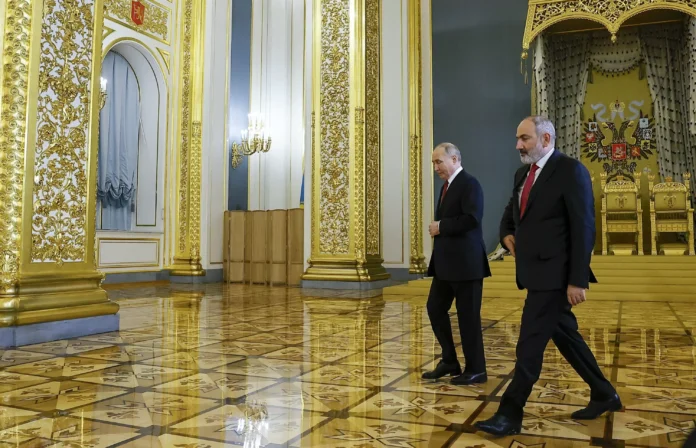Armenia’s Prime Minister, Nikol Pashinyan, has recently made a statement that has caused quite a stir in the international community. In a press conference on Wednesday, Pashinyan declared that Armenia sees the Russian-led military bloc, Collective Security Treaty Organization (CSTO), as a threat to its existence. This statement has raised concerns and questions about the relationship between Armenia and its long-time ally, Russia.
The CSTO is a military alliance formed in 1992 between six former Soviet republics, including Armenia and Russia. Its main purpose is to ensure the collective defense and security of its member states. However, Pashinyan’s statement suggests that Armenia does not feel secure within this alliance and sees it as a potential threat to its sovereignty.
The Prime Minister’s statement comes at a time when Armenia is facing various challenges, including the ongoing conflict with Azerbaijan over the Nagorno-Karabakh region and the recent political turmoil within the country. Pashinyan’s government came to power in 2018 after a peaceful revolution, promising to bring about democratic reforms and fight corruption. However, his administration has faced criticism and protests from opposition groups, accusing him of failing to deliver on his promises.
In his press conference, Pashinyan highlighted the need for Armenia to have a strong and independent military, stating that the country cannot rely solely on the CSTO for its defense. He also expressed concerns about the increasing presence of Russian troops in Armenia, stating that it could potentially undermine the country’s sovereignty.
This statement has sparked a debate within Armenia and has been met with mixed reactions. Some see it as a bold move by the Prime Minister to assert Armenia’s independence and strengthen its position in the region. Others view it as a risky move that could potentially damage the country’s relationship with Russia, its main economic and military ally.
Armenia’s concerns about the CSTO are not unfounded. In recent years, Russia has been accused of using its military presence in Armenia to exert influence and interfere in the country’s internal affairs. There have also been reports of Russian troops conducting joint military exercises with Azerbaijan, Armenia’s arch-rival in the Nagorno-Karabakh conflict. These actions have raised suspicions and doubts about Russia’s true intentions in the region.
However, it is essential to note that Russia has been a crucial ally for Armenia, providing military and economic support. The two countries have a long history of cooperation and share strong cultural and historical ties. Therefore, it is crucial for Armenia to maintain a good relationship with Russia while also addressing its concerns about the CSTO.
In response to Pashinyan’s statement, the Russian Foreign Ministry released a statement reaffirming its commitment to the CSTO and its support for Armenia’s security. The statement also emphasized the importance of maintaining a constructive dialogue between the two countries to address any concerns and strengthen their partnership.
It is evident that Armenia’s concerns about the CSTO are complex and require careful consideration. The country’s security and sovereignty must be a top priority, but it is also essential to maintain strong and friendly relations with its allies. As Pashinyan himself stated, Armenia needs a balanced and multi-vector foreign policy that takes into account its national interests and security concerns.
In conclusion, Pashinyan’s statement about the CSTO has sparked a much-needed discussion about Armenia’s relationship with its allies and its position in the region. It is a reminder that in today’s complex and ever-changing world, countries must carefully assess their alliances and partnerships to ensure their security and sovereignty. It is also an opportunity for Armenia to strengthen its position and assert its independence while maintaining friendly relations with its allies.


